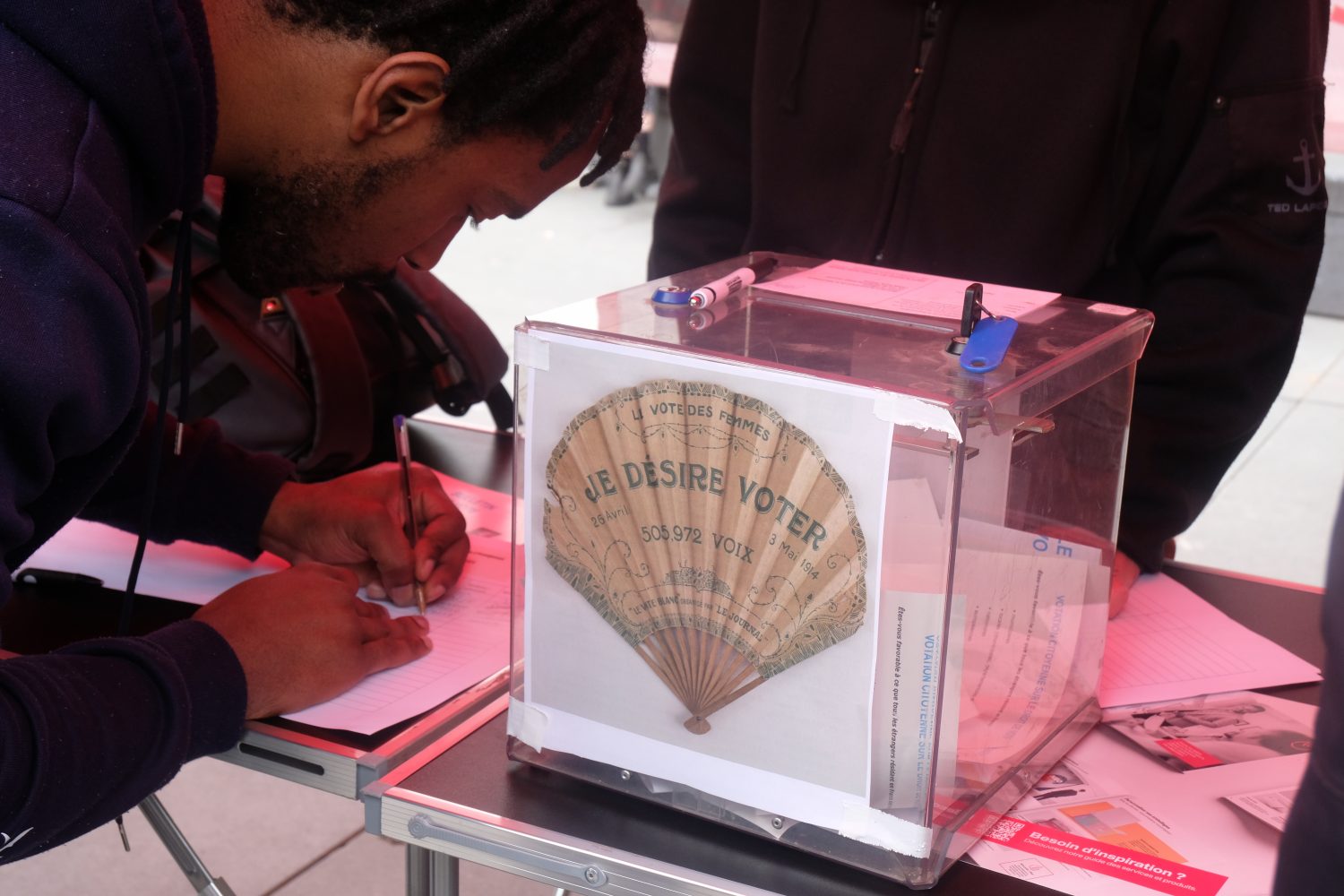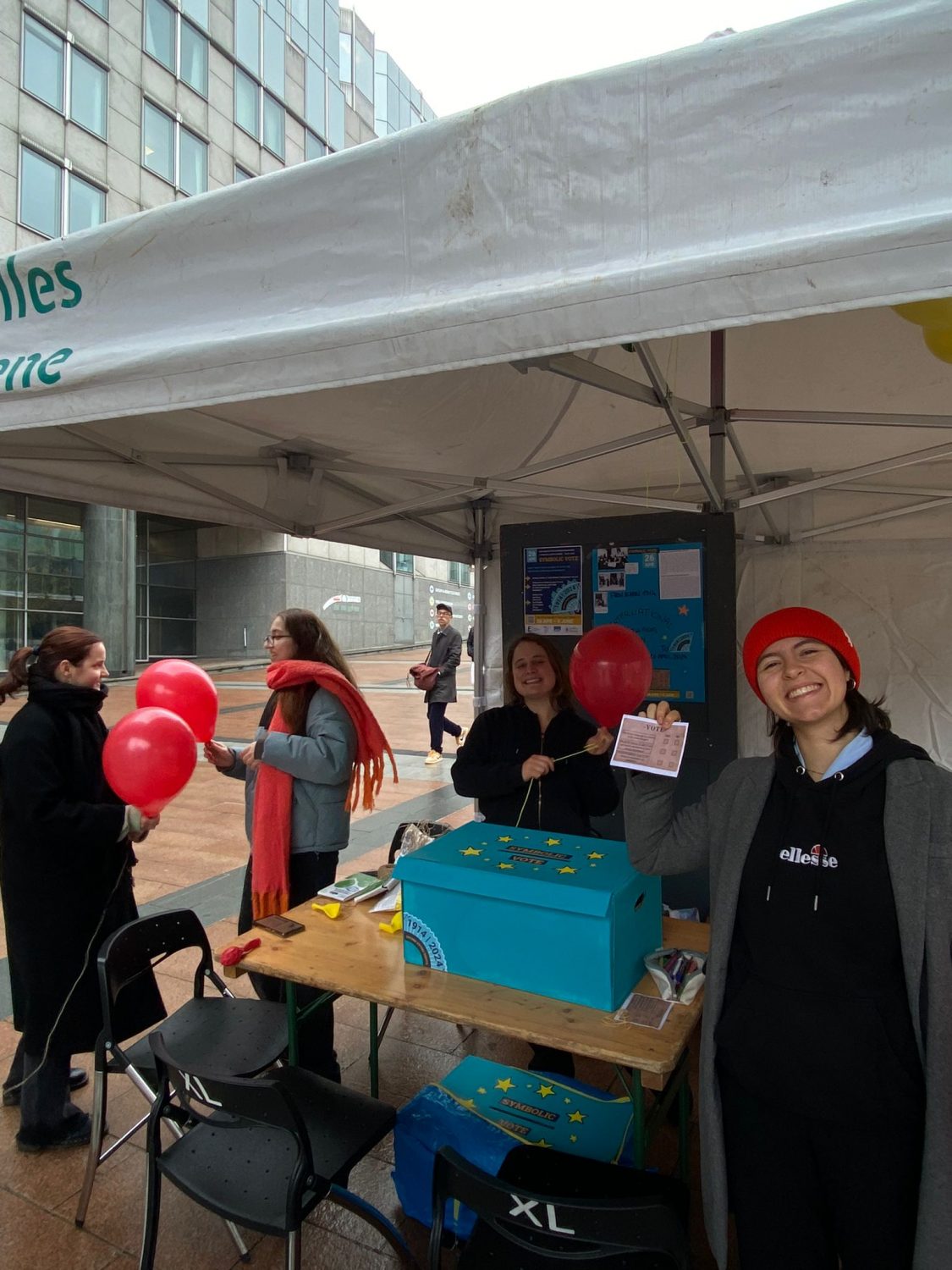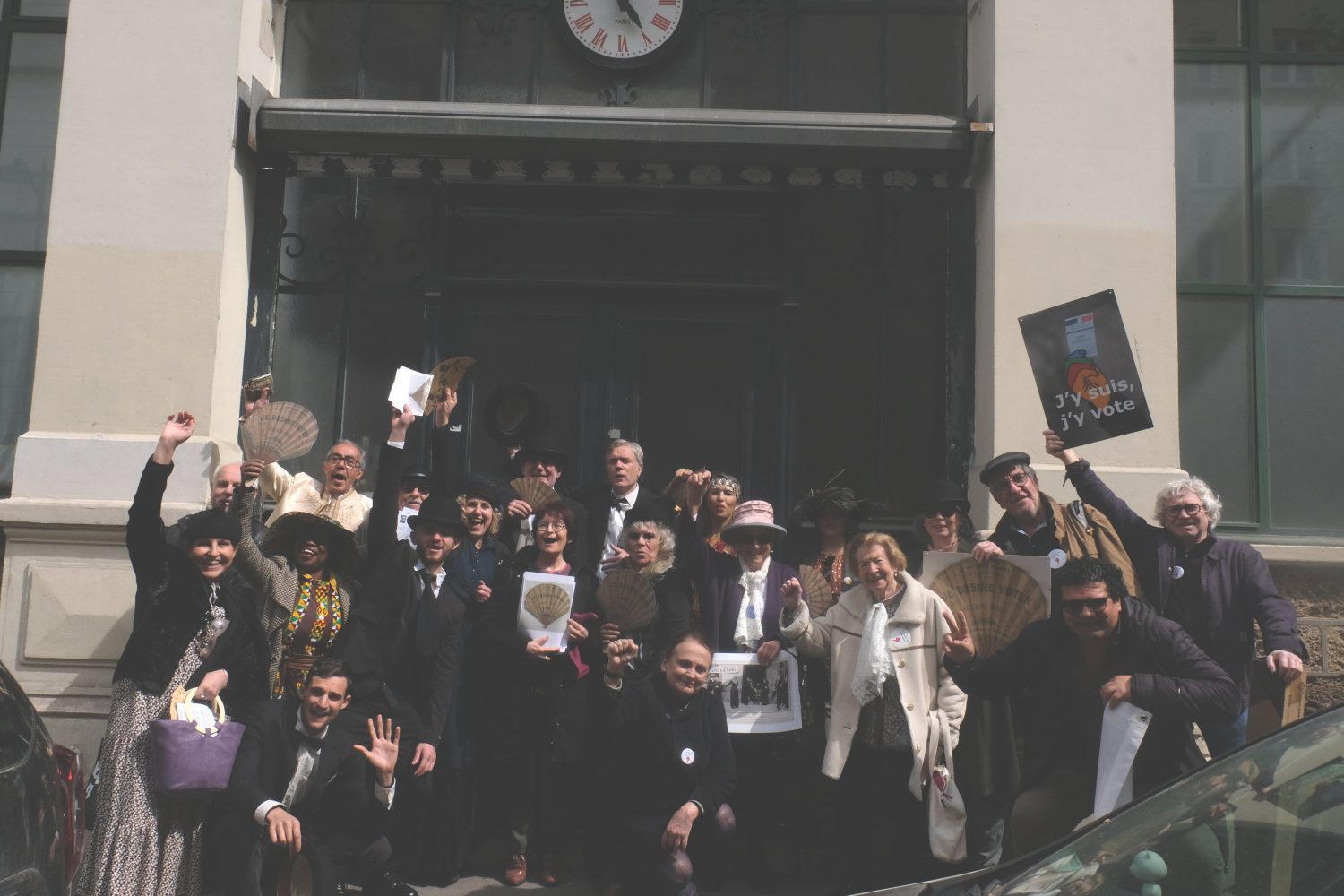Since 1994, all adult European Union (EU) citizens have been granted the opportunity to participate in or run for local elections across EU Member States. However, voting rights are still restricted for non-EU citizens in many countries. This issue was highlighted on International Voting Rights Day, with symbolic voting held to raise awareness and promote commitment to voting rights within the EU.
On April 26 th , 2024, the fourth edition of the International Day for voting rights was celebrated by the Voting Rights for All Residents (VRAR) network, including, Freiburger Wahlkreis 100 % as well as the French collective “J’y suis, j’y vote” at Place de la République in Paris, and ECIT Foundation and Stand Up for Europe on the Esplanade of the European Parliament in Brussels, convened hundreds of citizens to underscore the significance of broadening political participation within the EU. Coinciding with the 110th anniversary of the first symbolic vote by French women, the trans-national event aimed to urge especially young people to exercise their voting rights and never to take them for granted.



In Paris, three days of activities took place to strengthen local awareness on the issue of voting rights. April 26th is a special date in French history, referring to the ‘sauvage’ referendum for women’s suffrage 110 years ago. Supported by feminist activists and a local newspaper, the struggle for women’s right to vote was only passed in 1944. Thus, it was more than fitting that the symbolic vote that asked passerbyers whether non-EU citizen residents should have the right to vote was carried out on this significant day. To symbolize this historic event, supporters dressed up in historically accurate clothes to symbolize the parallel between the campaign for women’s suffrage in 1914 and advocating for the right to vote for non-EU citizens in 2024.
After a full day of collecting votes, at 6 pm, the votes were counted and declared by the participating mayors of Paris.
On Saturday, moderated by Mrs Habiba Bigdade from La Ligue des Droits de l’Homme, a conference was held at the Palais du Luxembourg. Political speakers such as Danièle Obono, Member of Parliament for Paris, and Tom Brake, former British MP, discussed voting rights in the context of the upcoming European elections. The academic perspective was brought in with Catherine Wihtol de Wenden, a researcher at Sciences Po Paris and Jean-Daniel Levy from the Harris Interactive Polling Institute. Michelle Perrot, professor, and historian from University Paris-Diderot, together with Monique Dental from the ‘Ruptures’ spoke on voting rights as a need for an inclusive democracy. The next day, a guided tour on the Parisian sites of the ‘sauvage’ vote on April 26 th in 1914 took place, encompassing visiting the places where symbolic polling stations were opened, e.g. near girls’ canteens and cooperatives and information centers for women
seeking to study or work.
At the initiative of VRAR of which the French Collectif J’y suis j’y vote ! is a member, with the support of ANVITA, the association of welcoming cities, the mayor of Paris Anne Hidalgo signed the European appeal in favour of the right of foreign residents to vote in local elections. She joined as one of the first of around fifty mayors of European cities, including mayors in French cities Lyon, Strasbourg, Grenoble, Rouen, and the mayors of Freiburg, Bologna, and Geneva in the rest of Europe. On the other hand, in Brussels, a symbolic vote was conducted on three propositions, with more than 400 individuals participating in the process. The ballot included:
- lowering the voting age to 16;
- expanding the rights of EU citizens living in other Member States to stand for election; and
- extending political rights to all residents, regardless of citizenship status.
Online voting remains open until June 9th , 2024, the last day of the European elections. The most significant and widely discussed question was the first one. There was evident enthusiasm for granting voting rights to individuals at that age, as a potential vote-extension carries significant benefits for fostering political engagement and democracy throughout the EU, strengthening concerns facing young Europeans, such as education, employment, and climate change. However, discussions on the Esplanade brought forth opposing views, highlighting concerns about potential lack of political maturity among this age group. During discussions with young people in the age group concerned, it became clear that the enthusiasm that was being portrayed was not entirely accurate.
There was a fear of being entrusted with responsibilities, a fear of not being ready to participate in democratic life. This fear was illustrated during the vote count, when the results were far from what had been anticipated.
The second question addressed in the symbolic vote in Brussels concerned efforts to enhance inclusivity and integration by expanding voting and candidacy rights. While EU citizens have voting and candidacy rights in local and European elections in their place of residence, they lack these rights in other elections. This issue is compounded by lower voter turnout among mobile EU citizens compared to the European elections average, alongside disenfranchisement of many EU citizens residing outside the EU. One potential challenge to advancing this proposal is the risk of diluting the concept of citizenship tied to nationhood. Nonetheless, if the aim is to broaden voting rights, promote political inclusivity, and reinforcing democratic principles. This proposal for an extension of the voting rights was well received on the Esplanade, arguing that every European taxpayer should be able to participate in the democratic process of the country in which they reside.
The third question pertained to the extension of political rights to all residents, regardless of citizenship status. This issue has been highlighted by organizations like the ECIT and Voting Rights for All Residents for several years. Thirty years ago, when electoral rights were first extended with the establishment of EU citizenship by the Maastricht Treaty, there was a recognized need to bridge the gap between mobile EU citizens and other residents. Currently, 12 Member States have extended the right to vote in local elections. Extending political rights to all residents is seen to enhance inclusivity and integration, fostering a more diverse representation of interests. This outstretched hand towards foreign residents could resolve the illegitimacy of politicians who are currently elected without considering the voice of the majority in certain cities or regions. More controversial, this question divided opinion along age and country lines. Some people refrained from answering it.
There is a necessity for citizens to be more cognizant of their rights and for those rights to be clearly defined and expanded in decision-making processes.
Efforts must be undertaken to enhance the accessibility and inclusivity of the democratic process for all segments of society. Inclusive governance also entails fostering dialogue and collaboration among diverse stakeholders, including governmental bodies, civil society organizations, and ordinary citizens. This might eventually bolster the EU’s institutions and enhance their resilience against external challenges. In a genuinely representative democracy, the varied perspectives and concerns of the entire population must be considered when crafting policies and governance frameworks. Particularly at the local level, democracy will only be complete when all residents are able to choose those who represent them and take decisions that affect their daily lives. Currently, only 14 out of 27 States of the EU grant local voting rights to all foreign residents.
Extending voting rights upholds the principle of equality, asserting that everyone should enjoy an equal opportunity to engage in the democratic process. Through the extension of voting rights, societies affirm the inherent value and dignity of every person, irrespective of their socioeconomic standing, ethnicity, religion, or gender. The events in Brussels and Paris, but we also trust in the online voting still underway, remind us that people take to the streets for their rights and the responsible expansion of those rights. The symbolic vote in the European capitals is an expression of a democratic movement that, we hope, must be considered at the European politics’ level.
When individuals believe their voices matter and have a role in shaping policies that impact their existence, they are more involved and committed to the welfare of their societies.
Last April 26th, place de la République and Esplanade demonstrated that.
Amedeo Gasparini. Swiss-Italian freelance researcher and author with two master’s degrees in international relations from Prague and Utrecht. He enjoys diversifying his professional experiences and contributes articles to several newspapers and online portals. His research interests are political liberalism, geopolitics, and Global North. Above all, he loves traveling and writing, see www.amedeogasparini.com.
Cindy Zheng from Germany is currently finishing her graduate studies in European Policies and Public Administration at KU Leuven / Sciences Po Paris. She is part of EA’s D.E.M.O. programme and advocates for humanist and civic values, especially in the area of digital transformation and development cooperation.
Selma Remond. French student about to obtain two degrees from the University of Brest, one in law and the other in applied foreign languages. She plans to study for a Masters in European Union law, to build up a body of knowledge that she can then put to good use in causes close to her heart. She would like to put the law at the service of feminist, ecological and social causes.